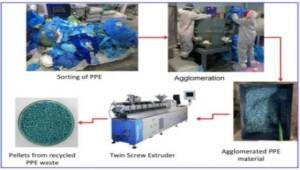While the COVID-19 pandemic has been raging worldwide, there has been comparatively much less chatter about the associated waste generation from the healthcare sector. To this effect, CSIR-National Chemical Laboratory (CSIR-NCL), Pune, jointly with Reliance Industries Ltd. (RIL) and several other companies from Pune have managed to manufacture useful moulded plastic components from COVID-19 PPE waste, as per a press release from the companies. The pilot project has the potential to be implemented throughout the country to recycle PPE waste into useful and safe products, as per the press release. Ever since the COVID-19 outbreak, there has been a substantial increase in demand for single use plastic items such as PPE, masks, gloves, etc. Across India, more than 200 tons of COVID-19 related waste was generated every day in May 2021. Usually, this hazardous waste is incinerated at central waste management facilities. However, this is not conducive to the environment as incineration is energy-intensive and leads to the release of harmful greenhouse gases, the press release further stated. CSIR-NCL, RIL and other companies thus tried to develop an end-to-end process for effective recycling of COVID-19 plastic waste to produce plastic products. The focus was on the conversion of suitable plastic waste for downstream processing and identification of potential stakeholders/markets for creating value for entire supply-chain. In a proof-of-concept study, the CSIR-NCL team successfully demonstrated the lab-scale manufacture of moulded automotive products from the decontaminated PPE plastic waste (at M/s Niky Precision Engineers, Pune) by leveraging the existing recycling infrastructure available in Indian cities. CSIR-NCL and RIL have now signed an MoU to scale up the production, laying a path to take the concept to the national level. A pilot scale of 100 Kg in the Pune city area was successfully implemented by collaborating with Pune-based companies like M/s APPL Industries Limited, M/s SKYi Composites, M/s Harsh Deep Agro Products, M/s Urmila Polymers, M/s Jai Hind Autotech Pvt. Ltd., who produced the recycled goods. The feed material (PPE kits) was collected and decontaminated by Passco Environmental Solutions, a waste management company located in Pune. CSIR-NCL secured all regulatory approvals needed from the Maharashtra Pollution Control Board (MPCB) to complete this pilot trial. The technical journey of CSIR-NCL, aided by Reliance and CSIR-Indian Institute of Petroleum (CSIR-IIP) Dehradun, with funding from the Council of Scientific and Industrial Research, mainly involved converting the decontaminated PPE waste (mainly comprising PPE suits/overalls) into an easily processable and upcycled agglomerated form (pellets or granules). [caption id=“attachment_9991891” align=“alignnone” width=“300”]  Sorting and Agglomeration Process[/caption] It was ensured that the polymer pellets show the right attributes necessary for successful conversion to produce nonfood applications, including high-performance automotive components. This pilot project can be implemented across India to build a sustainable circular “green” economy that can propel India’s growth in this relatively untapped sector and contribute towards India’s socio-environmental targets. Disclaimer: Network18 and TV18 - the companies that operate Firstpost - are controlled by Independent Media Trust, of which Reliance Industries is the sole beneficiary.
Ever since the COVID-19 outbreak, there has been a substantial increase in demand for single-use plastic items such as PPE, masks, gloves, etc and their incineration adds to already high pollution levels
Advertisement
End of Article


)

)
)
)
)
)
)
)
)



